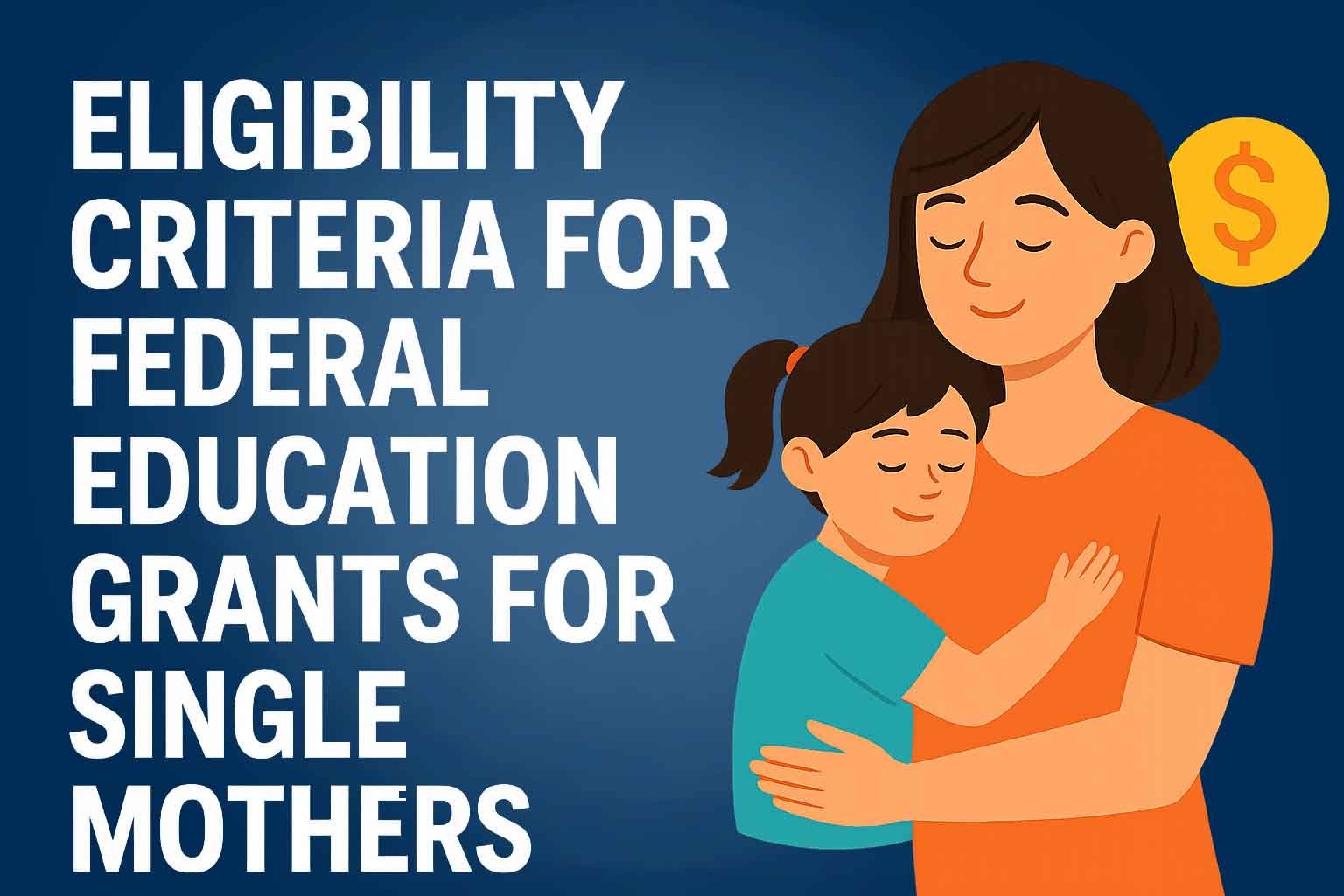Balancing education, parenting, and finances is no easy task, especially for single mothers. Lets explain a bit about Eligibility Criteria for Federal Education Grants for Single Mothers. Many women in this situation dream of furthering their education to create a better future for themselves and their children. But with rising tuition fees, childcare costs, and daily responsibilities, the path to a college degree can feel out of reach. That’s where federal education grants come in — offering real, tangible financial support without the burden of repayment.
This guide walks you through everything you need to know about federal education grants specifically designed to help single mothers. From eligibility requirements to application tips and additional resources, we cover it all to help you get started.
What Are Federal Education Grants for Single Mother?
Federal education grants are funds provided by the U.S. government to help students pay for college or career school. Unlike loans, grants do not need to be repaid, making them an excellent option for single mothers trying to manage both family and finances. These grants are awarded based on financial need, and in some cases, academic merit or field of study.
Grants vs. Loans vs. Scholarships
- Grants: Based on financial need; no repayment required.
- Loans: Must be repaid with interest, which can be a financial burden for single mothers.
- Scholarships: Often merit-based; no repayment required but may have academic or extracurricular requirements.
Top Federal Education Grants for Single Mother

Here are some of the most accessible and beneficial federal education grants available:
1. Federal Pell Grant
- Who qualifies: Low-income undergraduate students who haven’t earned a bachelor’s degree.
- Amount: Up to $7,395 per academic year (2024–2025 cycle).
- How to apply: Complete the FAFSA annually.
- Why it’s important: This is the most widely used and accessible grant, making it the backbone of federal aid.
2. Federal Supplemental Educational Opportunity Grant (FSEOG)
- Who qualifies: Students with exceptional financial need.
- Amount: Ranges from $100 to $4,000 per year.
- Priority given: Pell Grant recipients with the lowest expected family contributions (EFC).
3. TEACH Grant
- Who qualifies: Students who plan to become teachers in high-need fields.
- Amount: Up to $4,000 per year.
- Conditions: Must teach for four years in a low-income school; otherwise, it converts to a loan.
4. Iraq and Afghanistan Service Grant
- Who qualifies: Students who lost a parent during military service in Iraq or Afghanistan after 9/11.
- Amount: Equivalent to the maximum Pell Grant.
5. Academic Competitiveness Grant (ACG) (no longer active but good to know)
- Note: This was available to first- and second-year students. It has since been phased out but may be reinstated in the future.
General Eligibility Criteria For Federal Education Grants for Single Mother
While each grant has its own specific requirements, the following general criteria must typically be met:
- U.S. Citizenship or Eligible Non-Citizen: You must be a U.S. citizen or hold an eligible immigration status.
- Valid Social Security Number: Required to process your FAFSA.
- High School Diploma or GED: Proof of secondary education completion is necessary.
- Enrollment in an Eligible Program: You must be enrolled or accepted into an eligible degree or certificate program.
- Demonstrated Financial Need: Based on your FAFSA and Expected Family Contribution.
- Satisfactory Academic Progress: Maintain the minimum GPA and course completion rate.
- No Default on Federal Student Loans: Past loan defaults must be resolved before applying for new aid.
Specific Considerations for Single Mothers

Single mothers often qualify for higher amounts of aid due to their financial responsibilities. Here’s how to maximize your benefits:
1. Income Level
Because single mothers typically manage a household on one income, this often translates into a lower EFC, making you eligible for higher aid amounts.
2. Household Size
When filling out the FAFSA, list your dependents (children you support financially). A larger household size can significantly increase your aid.
3. Part-Time or Full-Time Enrollment
You don’t need to attend college full-time. Many grants still apply to part-time students, though the amounts may be lower. This flexibility is perfect for mothers juggling jobs and parenting.
4. Childcare and Campus Services
Many colleges offer free or low-cost childcare services for student-parents. You can also apply for additional help through the CCAMPIS program, which specifically supports childcare for low-income parents pursuing education.
5. Flexible Learning Options
Online or hybrid learning is increasingly supported by federal financial aid programs. If you can’t commit to in-person classes, you can still pursue a degree on your schedule.
How to Apply for Federal Education Grants for Single Mother

Step-by-Step Application Process
- Create an FSA ID at studentaid.gov — this is your digital signature.
- Complete the FAFSA Form — open every year on October 1.
- List Colleges or Career Schools — the FAFSA will send your info to them.
- Submit Verification Documents if requested.
- Review Your Student Aid Report (SAR) — check for errors.
- Accept the Aid Offer — log into your college’s portal to accept the grants.
Application Tips:
- Apply early to receive the most aid.
- Double-check all entries on the FAFSA.
- Reapply every academic year.
- Talk to a financial aid advisor if you’re unsure.
Other Grants and Resources to Explore
In addition to federal options, there are state and private resources available:
State Grant Programs
Each state offers its own financial aid programs. Visit Benefits.gov and select your state to find local opportunities.
Private & Nonprofit Grants
Organizations like Raise the Nation and Soroptimist Live Your Dream Awards provide scholarships and grants to single mothers.
Employer Tuition Assistance
Some employers offer educational reimbursement or scholarships to employees. Check with your HR department.
Grants for Single Mothers to Buy a Home
For single mothers dreaming of homeownership, there are several grant programs designed to turn that goal into reality. These grants help cover down payments, closing costs, or even partial mortgage assistance—reducing the financial burden of buying a home. Programs like the HUD-sponsored HOME Investment Partnerships Program, National Homebuyers Fund, and state-level First-Time Homebuyer Grants offer valuable aid. Many nonprofits and local housing authorities also provide assistance targeted specifically at single parents. Unlike loans, these grants don’t require repayment, making them a powerful tool for achieving long-term stability and security for mothers and their children.
Housing Assistance for single Mothers
Securing stable housing is often a major challenge for single mothers balancing work, childcare, and finances. Thankfully, various government and nonprofit programs offer housing assistance for single mothers in need. Programs like Section 8 Housing Choice Vouchers, HUD Public Housing, and Temporary Assistance for Needy Families (TANF) provide rental support or subsidized housing options. Many local housing authorities and community organizations also offer emergency shelters, transitional housing, and utility aid. These resources not only offer a safe place to live but also provide stability that empowers mothers to focus on education, employment, and long-term financial independence.
Federal Grants for Single Mothers to Buy a Car
Reliable transportation is essential for single mothers to maintain employment, attend school, and manage family responsibilities. While there are no direct federal grants for single mothers to buy a car, assistance is available through related programs. Some states offer transportation assistance through Temporary Assistance for Needy Families (TANF) or Job Access and Reverse Commute (JARC) programs. Additionally, nonprofit organizations like 1-800-Charity Cars and Working Cars for Working Families help single mothers obtain free or low-cost vehicles. These programs don’t require repayment and can significantly improve daily life and long-term self-sufficiency.
Government Grants for single Mothers to pay bills
Paying household bills can be a major challenge for single mothers living on a limited income. Fortunately, several government grants for single mothers to pay bills exist to help ease this financial burden. These grants are designed to assist with essential expenses like rent, electricity, water, heating, food, and even phone services. Programs such as Low-Income Home Energy Assistance Program (LIHEAP) help cover utility costs during extreme weather months, while Supplemental Nutrition Assistance Program (SNAP) provides food assistance to ensure children have access to healthy meals.
Single mothers may also qualify for Temporary Assistance for Needy Families (TANF), which offers cash support to help cover monthly bills and emergency needs. For housing-related costs, the Section 8 Housing Choice Voucher Program helps subsidize rent, allowing moms to focus their income on other expenses. Phone and internet bills may be reduced through Lifeline, a federal benefit program that makes communication services more affordable for low-income families.
Many of these programs can be accessed through local departments of social services or by visiting Benefits.gov. While not all assistance is labeled specifically as “grants,” these government-funded resources act as critical lifelines for single mothers striving for financial stability and independence.
Free Government Grant Money For Single Moms
Single moms often face financial hardship while trying to provide for their children alone. Thankfully, several free government grant money programs are available specifically to help single moms cover essential living costs, pursue education, or start a business. These grants are not loans—they don’t need to be repaid—making them a powerful tool for achieving financial stability and long-term growth.
One of the most accessible options is Temporary Assistance for Needy Families (TANF), which provides monthly cash assistance for essentials like food, rent, and utilities. The Supplemental Nutrition Assistance Program (SNAP) helps ensure children receive healthy meals, while Women, Infants, and Children (WIC) offers nutritional support for pregnant women and young children. For housing, the Section 8 Housing Voucher Program reduces monthly rent burdens. Meanwhile, Pell Grants and Federal Supplemental Educational Opportunity Grants (FSEOG) help single moms return to school or complete degrees.
In addition to these federal programs, many states also provide their own grant initiatives specifically for low-income parents. To explore eligibility and apply, moms can visit Benefits.gov or their local Department of Human Services. With the right combination of aid, single mothers can regain control over their finances and build a more secure future for their families.
FAQs
1. Can I qualify for grants if I attend school part-time?
Yes. Most federal grants are available to part-time students. However, the award amount may be prorated based on your enrollment status.
2. Are grants available for online education?
Absolutely. If your program is accredited and eligible for federal aid, you can receive grants.
3. Do I need to apply for grants every year?
Yes. You must complete and submit the FAFSA annually to continue receiving aid.
4. Can I receive multiple grants at once?
Yes, you can stack multiple grants such as the Pell Grant and FSEOG, depending on your need and eligibility.
5. Does marital status affect eligibility?
Yes. If you are legally separated or divorced, only your income is considered on the FAFSA.
6. What if I defaulted on a student loan?
You need to resolve the default, possibly through loan rehabilitation or consolidation, to become eligible again.
7. Are there grants for childcare expenses?
Yes. The CCAMPIS program and certain campus services may help cover or reduce childcare costs.
8. How is financial need determined?
The FAFSA calculates your EFC using income, family size, and number of dependents.
9. Can single mothers get help beyond tuition?
Yes. Grants can also cover books, supplies, housing, and transportation.
10. Where can I get help filling out the FAFSA?
You can contact your school’s financial aid office or use online support at studentaid.gov.
Conclusion
Being a single mother and pursuing an education may seem overwhelming, but federal grants can make a significant difference. From Pell Grants to childcare support programs, these financial tools help you take control of your future. Start by filling out the FAFSA, explore every available opportunity, and don’t hesitate to reach out for help. Your journey toward financial independence and academic success begins with one application.
Explore more helpful resources in our Federal & State Grants section today!
For More Information you can check our Home Page.
Recent Posts
- Education Grants for Adults Returning to School in 2025: Your Complete Guide
- Healthcare Grants for Seniors Over 60 in 2025: Your Complete Guide to Free Support
- Free Government Money for Low-Income Families 2025: Real Programs That Help
- Eligibility Criteria for Federal Education Grants for Single Mothers
- How to Apply for Federal Housing Assistance Grants in 2025
